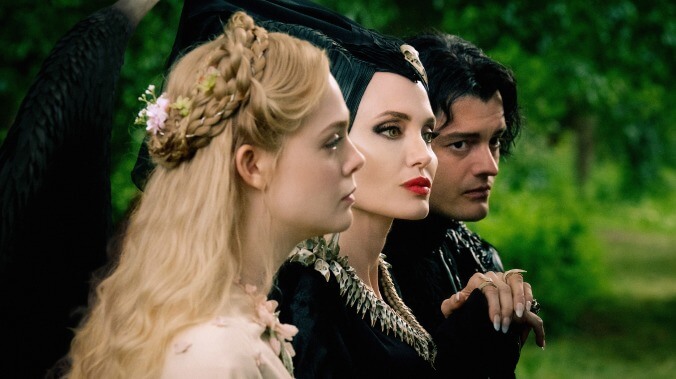Angelina Jolie is less Mistress Of Evil than one-liner machine in another mildly revisionist Maleficent

What a strange signature character Angelina Jolie has sketched out for herself in the Maleficent movies, which currently represent two of her three big-screen appearances in the past eight years. Casting Jolie as the live-action embodiment of the evil fairy from Disney’s gorgeous 1959 cartoon Sleeping Beauty seemed like a coup—and it was enough to make a long-gestating live-action retelling of Sleeping Beauty both a go picture and a big hit. But while that 2014 movie took some storytelling risks repositioning one of animation’s most famously scary villains as a secret hero (the prefix “anti-” barely even applied), Maleficent in the flesh turns out to be far more inert than her animated counterpart.
That’s clearer than ever in the sequel Maleficent: Mistress Of Evil. Jolie’s famous face is still visible beneath her ornate horns, but the other makeup effects—those impossibly sharp, pronounced cheekbones; the shifting multicolored eyes—feel pointlessly constricting. They turn one of the world’s most famous movie stars into an animatronic attraction, spouting pre-packaged, kid-movie lines of supposed menace like “Don’t ruin my morning.” It’s hard to say what’s odder about Maleficent 2: that Jolie disappears for long stretches of it, or that her elegant, imperious darkness isn’t much missed when she does.
Mistress Of Evil (whose title feels entirely incidental) continues the earlier revisions to Sleeping Beauty by insisting that no one in the world of the movie paid them much attention. Though that film ended with Maleficent breaking the curse she placed on Aurora (Elle Fanning) and Aurora becoming queen of the Moors (the fantastical, fairy-laden woods where Maleficent presides), narration and characters in the sequel explain that the more familiar version of the story—where the evil, unrepentant Maleficent’s curse is broken by the heroic Prince Phillip—nonetheless dominated the kingdom.
When Prince Phillip and Aurora become engaged to be married, Maleficent balks at her goddaughter consorting with more humans, while Phillip’s parents, particularly his mother Queen Ingrith (Michelle Pfeiffer), regard their potential new fairy-in-law with suspicion. Though Maleficent doesn’t much care for Phillip, she’s polite enough not to observe that he looks a bit different, the original’s Brenton Thwaites having been replaced by Harris Dickinson. (To be fair, this is about as close an approximation as possible without casting an actual glass of one percent milk in the part.)
Soon it becomes clear that Ingrith intends to use the nuptials as occasion to start a fairy-tale race war, pitting her kingdom’s humans against the cartoony inhabitants of the Moors. Maleficent, meanwhile, plays the part of the dragon in the recent How To Train Your Dragon sequel, discovering an outpost where her winged kind has hidden from untrusting humans. The pending conflicts between fairy and human play out more or less as expected, with passages of dark fantasy bookended by belabored kid-friendly zaniness, over-reliant on Jolie’s negligible skills with a one-liner. Some movies twist; the Maleficent series politely flips on a signal before any turns.
In some ways, Mistress Of Evil is a marginally more enjoyable fantasy scramble than its predecessor. Director Joachim Rønning is half of the duo that made the crisp adventure film Kon-Tiki, as well as the little-remembered fifth Pirates Of The Caribbean adventure. His work on Maleficent is more akin to the latter, heavy on Disney hired-hand excesses: a great volume of creatures, digital sets, and special effects, without much unifying aesthetic sense. But there are some inspired bits and pieces of a kiddie fantasy epic. Ingrith has some appealingly weird subordinates on her side, including a nefarious scientist called Lickspittle (Warwick Davis) and a castle guard (Jenn Murray) who plays a poison-releasing organ with deranged ecstasy. The Avatar-ish secret fairyland is neat-looking, especially with its gigantic ancient painting of a phoenix. Sam Riley continues to have fun as Diaval, the sidekick who Maleficent shapeshifts at her will.
The Maleficent series at least attempts to play around with, even actively undermine, Disney stories rather than erecting redundant monuments to its iconography. The movies might be more successful at this if they weren’t so eager to acknowledge it, forcing poor Jolie and Pfeiffer to huff through lines about how this isn’t a fairy tale, love doesn’t always work out, and Aurora can’t go “running around barefoot with flowers in [her] hair.” As before, the movie’s actual feelings on these matters are murky even (or especially) in its sunniest moments. Mistress Of Evil approaches ideas about grief, guilt, and sacrifice, only to use magic to undo the worst of it and dole out wacky punishments. Maleficent enters the movie seen only in silhouette, like an enchanted-forest Batman; she exits on a clunky quip. Every time the movie tries to harness Jolie’s complicated movie-star charisma, it flies away with her alter ego.